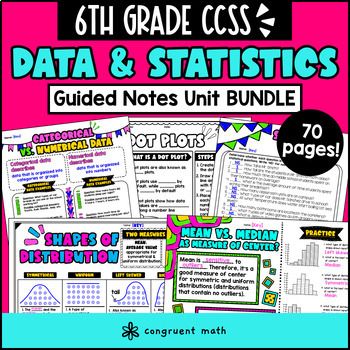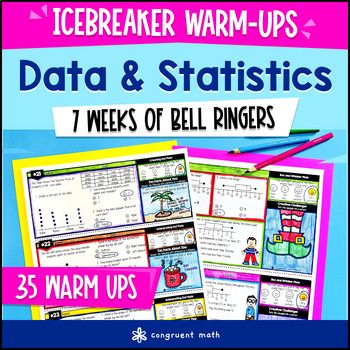Want more ideas and freebies?
Get my free resource library with digital & print activities—plus tips over email.
Join for free resources →
$19.99 · Extensions sold separately
Ever wondered how to teach data and statistics in an engaging way to your 6th-grade students?
In this unit plan, students will first learn about mean, median, and mode. Later on, they will build on this to learn about mean absolute deviation and shapes of distribution. Lastly, they will learn about statistical questions, dot plots, histograms, and box and whisker plots.
Each lesson helps students master the unit through artistic, interactive guided notes, check for understanding, and culminates with a real-life example that explores how these statistical concepts can be applied in real-world situations.
It's an exciting way to teach data and statistics while comprehensively meeting standards like mean, median, mode, variability, measures of center, and displaying numerical data visually.

$19.99 · Extensions sold separately
After this unit, students will be able to:
Before this unit, students should be familiar with:
Students will learn about statistical questions, categorical data, and numerical data in the context of variability in data.
Students will learn about mean, median, and mode.
Students will learn about mean absolute deviation and measure of variability.
Students will learn about the shapes of distributions, measures of center, and how to relate them to the context of data in real-life situations.
Students will learn to create and analyze histograms to display numerical data in plots on a number line.
Students will learn to construct and interpret dot plots.
Students will learn how to construct, interpret, and apply box and whisker plots to display numerical data.
$17.99
Students practice data & statistics including classifying statistical vs. non-statistical questions, classifying categorical vs. numerical data, identifying shapes of distribution, interpreting data in dot plots, histograms, stem-and-leaf plots, and box plots, measures of center (i.e. mean, median, mode), and measures of spread and variability (i.e. range, interquartile range, mean absolute deviations) with this 6th Grade CCSS Data and Statistics Pixel Art Unit Bundle. Contains 6 products with 15 pixel art activities total for a complete 6th grade Common Core data & statistics unit.

$6.99
Engage your 6th grade students in the data and statistics unit with daily math review warm ups activities! The math bell ringers contains practice on statistical questions, categorical vs. numerical variables, shapes of distributions, mean median mode & range, mean absolute deviation, dot plots, histograms, and box & whisker plots. The resource contains 31 pages (7 weeks of warm ups). It's perfect for daily math practice, spiral review, or quick test prep, aligned to CCSS and TEKS.
Unit 7
Geometry
Get my free resource library with digital & print activities—plus tips over email.
Join for free resources →